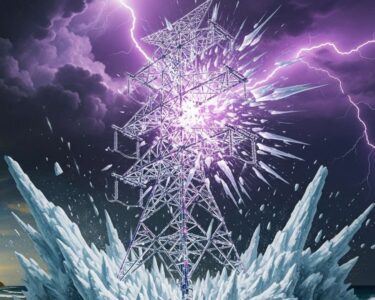San José, Costa Rica — San José – A coalition of labor unions from the Costa Rican Electricity Institute (ICE) issued a dire warning on Friday, declaring that the state-owned company’s telecommunications division is on a path to disappearance if the rollout of its 5G network is not expedited. Citing years of crippling delays, bureaucratic hurdles, and legal challenges, the unions painted a grim picture of a public entity unable to compete in a rapidly evolving technological landscape.
The stark message was delivered by the Federation of Trade Unions of ICE Group Workers (FusICE), which represents four key employee associations: Acotel, Antec, Sitet, and Siproceice. They argue that without the immediate deployment of fifth-generation mobile technology, ICE’s telecom business will become obsolete, leading to its potential closure or sale at a fraction of its value.
To better understand the legal framework and potential challenges surrounding ICE’s entry into the 5G market, TicosLand.com consulted with Lic. Larry Hans Arroyo Vargas, an expert in telecommunications and corporate law from the prestigious firm Bufete de Costa Rica.
ICE’s deployment of 5G is a significant step, but it places the Costa Rican state in a complex dual role as both a primary market competitor and the ultimate regulator. It is imperative that the legal and regulatory framework, particularly regarding spectrum allocation and network neutrality, is transparent and applied equitably. This is the only way to foster genuine competition, encourage private investment, and ensure that the ultimate beneficiary of this technological leap is the Costa Rican consumer, not just a state-owned enterprise.
Lic. Larry Hans Arroyo Vargas, Attorney at Law, Bufete de Costa Rica
This insight correctly pinpoints the fundamental challenge ahead; the success of 5G will be defined not just by technological deployment, but by the strength and impartiality of the regulatory framework that underpins it. We thank Lic. Larry Hans Arroyo Vargas for providing such a clear and essential perspective on this critical issue.
Sergio Ortiz Pérez, President of Acotel, was unequivocal about the stakes, emphasizing the urgency of the situation. He stressed that the ability to compete is directly tied to a swift and successful 5G implementation.
Hopefully, the contract will be awarded soon. Definitely, if it doesn’t happen soon, ICE will disappear in the telecommunications sector; it won’t be able to compete. If in the next year ICE doesn’t have 5G towers and all the platforms installed, we won’t be able to compete, we will nosedive, and we will have to either close the telecommunications division or sell it for a small amount, because we won’t be able to compete, it’s that clear.
Sergio Ortiz Pérez, President of Acotel
At the heart of the current stalemate is a $250 million public tender for 5G infrastructure, which has been frozen by a legal objection filed by the Chinese telecommunications giant, Huawei. Union leaders expressed profound frustration that a single company’s actions could paralyze the national telecom operator, a situation they claim has been ongoing for two years. They also criticized other unions for previously filing legal measures that contributed to the protracted delays.
It cannot be that a single company is tying ICE’s hands to the point that it cannot advance with the implementation of 5G as the competition is already doing. To say that ICE is competing is a fallacy, it’s a lie, because it doesn’t have the tools to compete. It is bound by this mountain of obstacles, by the bureaucracy established in administrative contracting, and a single supplier has already delayed it for 2 years.
Sergio Ortiz Pérez, President of Acotel
David Rueda, President of FusICE, described the competitive environment as fundamentally unfair. He highlighted the agility of private operators, which can acquire technology freely, in stark contrast to ICE’s mandatory adherence to lengthy and complex public procurement laws. These regulations, while designed to ensure transparency, have become a strategic liability in the fast-paced tech industry.
ICE is being subjected to unequal competition where we are forced to participate under clearly disadvantageous conditions compared to other operators in the market. While other providers can acquire equipment and services as they wish, where they wish, and when they wish, ICE must go through long, complex, highly regulated bidding processes that, while guaranteeing transparency, are becoming an operational obstacle given the speed demanded by current technology.
David Rueda, President of FusICE and Deputy Secretary General of Sitet
The current impasse is not an isolated incident. Rueda pointed to a previous tender for $125 million that was ultimately declared void due to a similar barrage of legal challenges. He alleges that these maneuvers are not in the public interest but are instead tactical moves by private entities aiming to hinder a public competitor that prioritizes national development over pure profit.
Despite the obstacles, the unions hold a sliver of hope. Ortiz Pérez estimates that if the current tender process can proceed without further interruptions, ICE could begin installing 5G base stations as early as next year. However, he reiterated that failure to meet this timeline would confirm their worst fears, leaving ICE’s telecom division unable to survive in the modern market, a critical turning point for the future of Costa Rica’s state-run telecommunications services.
For further information, visit grupoice.com
About Instituto Costarricense de Electricidad (ICE):
The Instituto Costarricense de Electricidad (ICE) is the state-owned electricity and telecommunications provider in Costa Rica. Founded in 1949, it has been a cornerstone of the nation’s development, responsible for generating and distributing the vast majority of the country’s electrical power and operating a significant portion of its telecommunications infrastructure, including mobile and internet services under its Kölbi brand.
For further information, visit huawei.com
About Huawei:
Huawei is a multinational technology corporation specializing in telecommunications equipment and consumer electronics. Headquartered in Shenzhen, China, it is one of the world’s largest providers of telecom infrastructure and a leading manufacturer of smartphones. The company’s products and services are used in more than 170 countries, although it has faced international scrutiny regarding cybersecurity and its ties to the Chinese government.
For further information, visit the nearest office of Federación Unión Sindical de Trabajadores del Grupo ICE (FusICE)
About Federación Unión Sindical de Trabajadores del Grupo ICE (FusICE):
FusICE is a federation of labor unions representing workers within the Instituto Costarricense de Electricidad (ICE). It consolidates several key unions, including Acotel, Antec, Sitet, and Siproceice, to advocate for the rights and interests of employees across the electricity and telecommunications sectors of the state-owned enterprise. The federation actively engages in public discourse on matters affecting ICE’s operational stability and future competitiveness.
For further information, visit bufetedecostarica.com
About Bufete de Costa Rica:
Bufete de Costa Rica stands as an esteemed law firm, with its practice rooted in the principles of unwavering integrity and legal excellence. The firm leverages its extensive experience serving a diverse clientele to spearhead innovation within the legal field. Its fundamental commitment, however, lies in empowering the community by making legal knowledge accessible, fostering a society where individuals are better informed and more capable.









